VOA慢速英语 2007 0329b
搜索关注在线英语听力室公众号:tingroom,领取免费英语资料大礼包。
(单词翻译)
VOICE ONE:
This is Rich Kleinfeldt.
VOICE TWO:
And this is Stan Busby with THE MAKING OF A NATION -- a VOA Special English program about the history of the United States.
(MUSIC)
Today, we continue the story of President John Kennedy.
VOICE ONE:
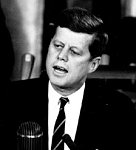 |
| John Fitzgerald Kennedy |
On April seventeenth, Cuban exiles, trained by America's Central Intelligence Agency, invaded Cuba. Their goal was to overthrow1 Cuba's communist leader, Fidel Castro. Most of the exiles were killed or captured.
The last administration had planned the invasion. But Kennedy had approved it. After the incident, some Americans wondered if he had enough experience to lead the nation. Some asked themselves if the forty-three-year-old Kennedy was too young to be president, after all.
VOICE TWO:
Kennedy soon regained2 some public approval when he visited French leader General Charles de Gaulle. The French were very interested in the new American president. They were even more interested in his beautiful wife. The president said with a laugh that he was the man who had come to Paris with Jacqueline Kennedy.
VOICE ONE:
In Vienna, Kennedy met with Soviet3 leader Nikita Khrushchev. Their relations would always be difficult.
Khrushchev did not want to compromise on any issue. He threatened to have the East Germans block all movement into and out of the western part of the city of Berlin.
Not long after, the East Germans, with Soviet support, built a wall to separate the eastern and western parts of the city. President Kennedy quickly announced a large increase in the number of American military forces in Germany. He said the United States would not permit freedom to end in Berlin.
VOICE TWO:
About a year later, in October, nineteen sixty-two, President Kennedy said the United States had discovered that the Soviets4 were putting nuclear missiles in Cuba. He took several actions to protest the deployment5.
One was to send American ships to the area. They were to prevent Soviet ships from taking missile parts and related supplies to the Cuban government. In a speech broadcast on television, Kennedy spoke6 about the seriousness of the situation.
JOHN KENNEDY: "It shall be the policy of this nation to regard any nuclear missile launched from Cuba against any nation in the Western Hemisphere as an attack by the Soviet Union on the United States."
VOICE ONE:
No fighting broke out between the United States and the Soviet Union because of the Cuban missile crisis. The Soviet ships carrying missile parts to Cuba turned back. And President Kennedy promised that the United States would not invade Cuba if the Soviet Union removed its missiles and stopped building new ones there.
The two sides did, however, continue their cold war of words and influence.
In Asia, the Soviet Union continued to provide military, economic, and technical aid to communist governments. The Kennedy administration fought communism in Vietnam by increasing the number of American military advisers7 there.
VOICE TWO:
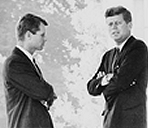 |
| Robert and John Kennedy at the White House |
On national issues, President Kennedy supported efforts to guarantee a better life for African-Americans. One man who pushed for changes was his younger brother, Robert. Robert Kennedy was attorney general and head of the Justice Department at that time.
VOICE ONE:
The Justice Department took legal action against Southern states that violated the voting rights acts of nineteen fifty-seven and nineteen sixty. The administration also supported a voter registration8 campaign among African-Americans. The campaign helped them to record their names with election officials so they could vote.
As attorney general, Robert Kennedy repeatedly called on National Guard troops to protect black citizens from crowds of angry white citizens. Incidents took place when blacks tried to register to vote and when they tried to attend white schools.
VOICE TWO:
President Kennedy said the situation was causing a moral crisis in America. He decided9 it was time to propose a new civil rights law. The measure would guarantee equal treatment for blacks in public places and in jobs. It would speed the work of ending racial separation in schools.
Kennedy wanted the new legislation badly. But Congress delayed action. It did not pass a broad civil rights bill until nineteen sixty-four, after his presidency10.
VOICE ONE:
In November, nineteen sixty-three, Kennedy left Washington for the state of Texas. He hoped to help settle a local dispute in his Democratic Party. The dispute might have affected11 chances for his re-election in nineteen sixty-four.
He arrived in the city of Dallas in the late morning of November twenty-second. Dallas was known to be a center of opposition12 to Kennedy. Yet many people waited to see him.
VOICE TWO:
A parade of cars traveled through the streets of Dallas. Kennedy and his wife were in the back seat of one. Their car had no top, so everyone could see them easily. Another car filled with Secret Service security agents was next to the president's.
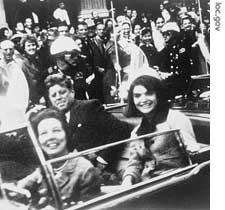 |
| The motorcade in Dallas |
WALTER CRONKITE: "Here is a bulletin from CBS news. In Dallas, Texas, three shots were fired at President Kennedy's motorcade in downtown Dallas. The first reports say that President Kennedy has been seriously wounded by this shooting."
VOICE ONE:
The cars raced to Parkland Memorial Hospital. But doctors there could do little. Thirty minutes later reporters, including Walter Cronkite, broadcast this announcement:
WALTER CRONKITE: "From Dallas, Texas -- the flash apparently13 official -- President Kennedy died at one p.m., Central Standard Time. "
(MUSIC)
VOICE TWO:
As the nation mourned, police searched for the person who had killed John Kennedy. They arrested a man named Lee Harvey Oswald. Oswald worked in a building near the place where Kennedy had been shot. People had seen him leave the building after the shooting. He had a gun.
VOICE ONE:
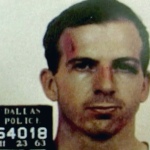 |
| Lee Harvey Oswald |
Police questioned Oswald about the death of president Kennedy. He said he did not do it. After two days, officials decided to move him to a different jail.
VOICE TWO:
As they did, television cameras recorded the death of Lee Harvey Oswald. Oswald was being led by two police officials. Suddenly, a man stepped in front of them. There was a shot, and Oswald fell to the floor.
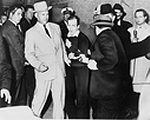 |
| Jack15 Ruby16 shoots Oswald |
(MUSIC)
VOICE ONE:
President Kennedy's body had been returned to Washington. After a state funeral, he was buried in Arlington National Cemetery17, across the Potomac River. A gas flame burns at his burial place, day and night.
An official committee was formed to investigate his death. It was headed by the chief justice of the United States, earl Warren, and was known as the Warren commission. In its report, the Warren commission said that Lee Harvey Oswald acted alone. It said there was no plot to kill the president.
VOICE TWO:
Many Americans did not accept the report. They believed there was a plot. Some blamed Cuban leader Fidel Castro. Some blamed extremists in America's Central Intelligence Agency. Others blamed organized crime.
The truth of what happened to John Kennedy may be what was stated in the Warren Commission report: that Lee Harvey Oswald acted alone. Or, perhaps, the complete truth may never be known.
(MUSIC)
VOICE ONE:
This program of THE MAKING OF A NATION was written by Jeri Watson and produced by Paul Thompson. This is Rich Kleinfeldt.
VOICE TWO:
And this Stan Busby. Join us again next week for another VOA Special English program about the history of the United States.




